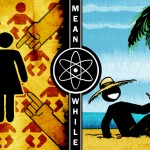Every Monday in Citizenship Confusion, Alan Noble discusses how we confuse our heavenly citizenship with citizenship to the state, culture, and the world.
One of the reoccurring themes of my column has been the fact that Christians must always place the authority and honor of God above the State. But what is a devoted Christian presidential candidate to say when asked, “If you encounter a conflict between your faith and the Constitution and laws of the United States, how would you resolve it? Has that happened, in your experience?”
I would hope that they would confess that they would obey God’s laws, even if it meant contradicting the laws of the State, but I would also want to know how they interpreted God’s laws and how they would define such a conflict.
Bill Keller, the executive editor of The New York Times, recently recommended that we pose this question and similar ones (some of which show a distinct ignorance about religion, as GetReligion has demonstrated) to Republican political candidates. The basis of this questionnaire seems quite valid to me: our “worldview” affects our theory of government and governing.
I want to know what Rick Perry thinks about David Barton, founder of WallBuilders– a man who argues that the parable of talents in Matthew 25 “conflict[s] with the notion of a tax on capital gains.”
I want Bachmann to answer this: “(a) Do you agree with those religious leaders who say that America is a “Christian nation” or “Judeo-Christian nation?” (b) What does that mean in practice?”
The majority of Keller’s questions strike me as helpful.
Marvin Olasky appears to disagree, and has offered his own set of questions which all address the implications of a belief in Darwinism: “In what ways is abortion, in that it kills millions who have below-average prospects in life, a good Darwinian way to improve humanity?”
While I don’t deny that a belief in evolution can and has led some to support horrific practices, I sincerely doubt that any presidential candidate would claim that Darwinism justifies abortions for the lower classes. One important distinction that must be made is that evolution is a theory of what happened and happens, it is not a theory of what ought to happen, although many act as though it were.
Christianity, however, is a claim about what happened, what will happen, the significance of life, and how we ought to respond. It seems much more reasonable to ask Christian politicians how they believe the Bible should inform public policy than it is to ask atheists how evolution should affect theirs. Instead, we should be asking non-Christian presidential candidates about their foundational beliefs:
What is “the good life”?
What role should the government play in promoting the good life?
How is justice determined?
If you encounter a conflict between your understanding of justice or the good life and the Constitution or laws of the United States, how would you resolve it?
All candidates should be open about their defining beliefs. Whether they are based on the Bible or secular humanism.











